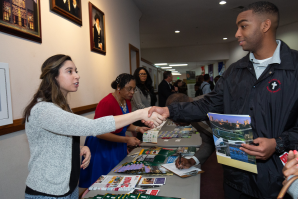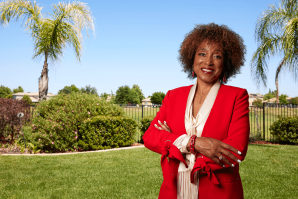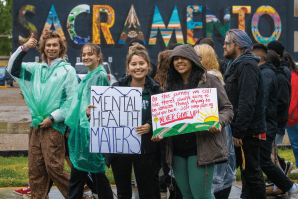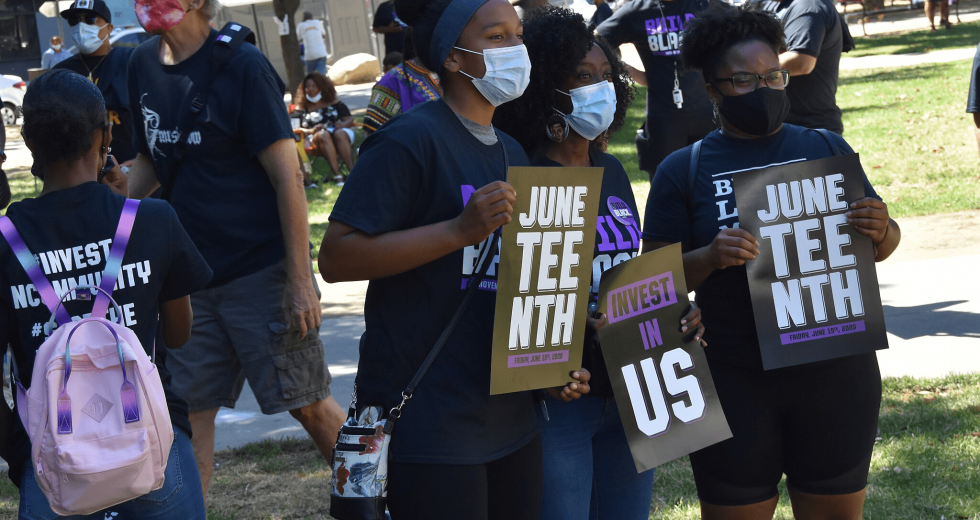William Land Park in Sacramento rang out with gospel music on a recent Friday night as the city kicked off festivities for Juneteenth, an annual celebration of Black culture and resilience that marks the day in 1865 when Major General Gordon Granger issued an order enforcing the Emancipation Proclamation in Texas. The nonprofit Sacramento Juneteenth held a “Gospel Under the Stars” concert, named in homage to the North Star that Harriet Tubman and others followed on their way to freedom. It brought musicians from around Northern California to the park, where they performed for an intergenerational crowd on picnic blankets and lawn chairs.
Though Juneteenth only became a federal holiday in 2021, Sacramento Juneteenth has been holding events for the holiday since 2001. Throughout the rest of the year, the organization promotes health and wellness through educational programs at local schools. One of its current focuses is mental health care, especially for the Capital Region’s Black community.
“Sacramento is a racist city underneath,” says Gary Simon, executive director of Sacramento Juneteenth. “We’re going to continue to push the history so it doesn’t repeat itself.” He says that white people experiencing mental health issues are more likely to receive treatment than Black people with the same issues, who are more likely to be incarcerated instead.
According to the U.S. Department of Health & Human Services, only one in three Black adults who need mental health care receive it. Though national and local governments begin to pay more attention to Black culture, such as through the federal recognition of Juneteenth, investment in Black mental health is still lacking. In the Capital Region, nonprofits like Sacramento Juneteenth and other organizations are working to pick up the slack.
Partnering with the community
In order to better care for Black patients, some mental health care providers in the Capital Region are engaging in cultural competency training. One organization facilitating this training is The Center at Sierra Health, a nonprofit developed by the Sierra Health Foundation with offices in Sacramento and Fresno. The nonprofit’s cultural training programs are succeeding so far, according to CEO Chet Hewitt, though no one organization “can do all that needs to be done,” he says.
The Center encourages health professionals to understand different beliefs, experiences and practices that may impact patients’ mental health and their understanding of mental health care. It also partners with Black organizations based in local communities to help these communities connect to the care they need.
Cultural competency training has historically been fractured, according to Dr. Ruth Shim, director of cultural psychiatry at UC Davis. This training has often reinforced stereotypes rather than focusing on individual patients’ needs. “We don’t have a mental health system that functions well,” Shim says, noting that mental health care remains unaffordable for many.
Shim researches the structural failures and social determinants of health that have led to the disproportionate decline of Black residents’ mental health. She is passionately calling for the implementation of structural change that can reverse this decline.
UC Davis Health’s Center for Reducing Health Disparities is working to jumpstart this change. The center is currently training mental health professionals from 44 counties on topics including COVID-19’s mental health impact and the social determinants of mental health. “We know disparities have been existing for decades, unfortunately,” says Dr. Sergio Aguilar-Gaxiola, founding director of CRHD. “Overall, the disparities got worse during COVID.”
To combat these disparities, CRHD, founded in 2005, is also screening for depression and anxiety free of charge, referring cases in dire need to health centers. For underserved communities, such as Sacramento’s LGBTQ community, CRHD has implemented disparity-reducing mental health efforts.
Fighting taboos
Grammy Award-winning rapper 50 Cent meets with local
schoolchildren during a Kings and Queens Rise mentoring and
motivational event put on by the Sacramento Kings at the Golden 1
Center. (Photo courtesy of the Sacramento Kings)

Another factor limiting care is the taboo against openly discussing mental health. To address this issue, Hewitt and The Center have partnered with the Sacramento Kings, using basketball as a hook to engage local youth in conversations about mental health. The program, Kings and Queens Rise, is now in its fifth season. It’s an example of a common trend: community-based organizations picking up the slack for federal, state and local government when it comes to mental health care disparity.
Dr. Khalima A. Bolden, a licensed clinical psychologist and the assistant director of clinical training at the UC Davis Early Psychosis Program, says there’s a reason for that stigma. Bolden says access Black people are often excluded from compassionate mental health care, and an individual’s first experience with the mental health care system determines their likelihood to trust the system again. This reality, coupled with systemic racism, led to a distrust in entering the system amongst communities of color.
Bolden says that mental health solutions must start with root causes — no kid is going to discuss their mental well-being if they’re hungry or without electricity, for example. She advocates for steady, long-term solutions rather than quick fixes and is pushing for the community-wide adoption of thorough needs assessments prior to mental health treatment.
“As a Black woman working in our community, please come visit me. Racial trauma is real,” says Bolden.
The lead photo is by Stephan Telm via Wikimedia Commons and is licensed under Creative Commons Attribution-ShareAlike 2.0 Generic. It was cropped to fit the page.
–
Stay up to date on business in the Capital Region: Subscribe to the Comstock’s newsletter today.
Recommended For You

Case Studies in DEI
How Capital Region organizations are investing in diversity, equity and inclusion
Across the Capital Region, companies and nonprofits are investing in diversity, equity and inclusion and seeing returns. Comstock’s spoke to DEI leaders at some of these organizations to learn about their methods and future initiatives.

Investing in Inclusion
How consultants help businesses incorporate diversity, equity and inclusion into how they do business
DEI generally has three components that work jointly. “Diversity is looking at the makeup of the organization. Equity is giving people what they need to be successful. Inclusion comes after getting diversity and equity, and that ensures people are contributing to that environment,” says Dr. Colette Harris-Mathews, principal consultant at Harris Mathews Consulting in Sacramento.

Local Organizations Support Mental Health Among Afghan Youth
The intergenerational trauma that young Afghan refugees inherit is compounded by legislation that could determine their stateside fate
Refugee youth often bring traumatic lived experiences, known as adverse childhood experiences, raising the demand for U.S.-based mental health services. A network of support groups has formed to provide culturally sensitive care and catch those falling through the cracks.

A Push for School-Based Mental Health
Ratcheted up by the pandemic, students’ mental health has become an important focus in schools
Schools and universities in the Capital Region have taken an array of approaches to assure mental health is one of the many pillars a student’s education addresses.



